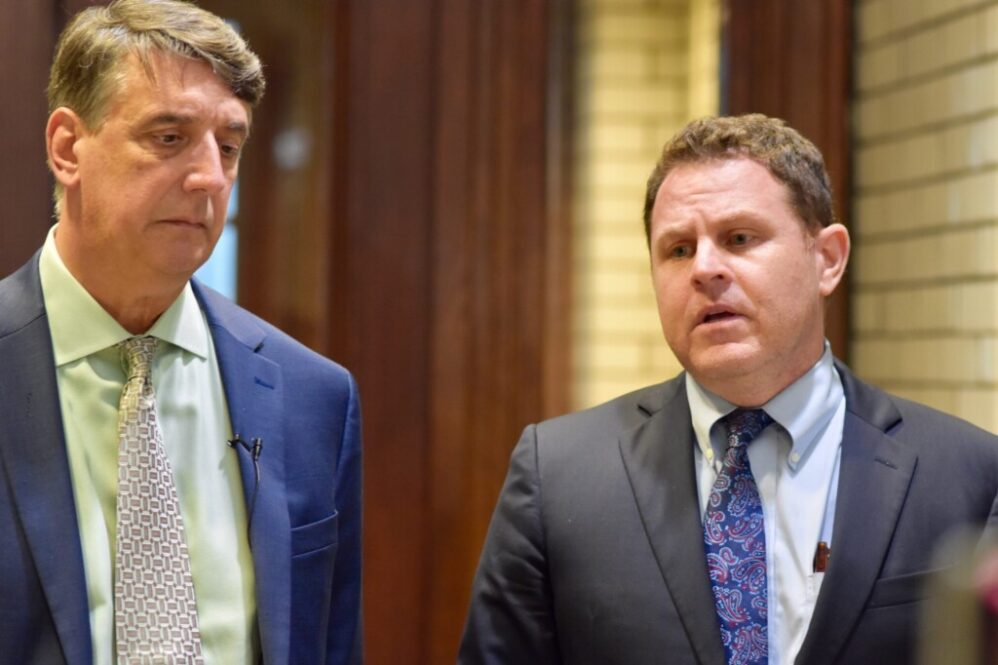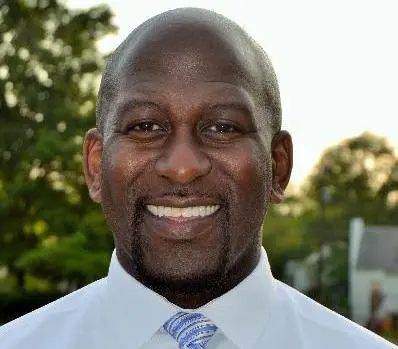MARYLAND MATTERS: The prospect of an extended General Assembly session seems less likely after House and Senate fiscal leaders announced a budget compromise Wednesday.
The announcement follows a flurry of activity between the two chambers late Tuesday and early Wednesday that included budget analysts meeting as well as conversations between the chairs of the House Appropriations Committee and Senate Budget and Taxation Committee. It also capped nearly a week of contentious meetings and briefings with reporters and included Gov. Wes Moore (D) issuing an executive order that could have extended the session 10 days beyond the scheduled April 8 final day.
“We think it’s a pretty strong deal, both sides can be satisfied,” said House Appropriations Chair Ben Barnes (D-Prince George’s and Anne Arundel). “It’s truly a compromise.”
Barnes and Senate Budget and Taxation Chair Guy Guzzone (D-Howard) outlined the broad strokes of the agreement during a briefing with reporters Wednesday.
“I think we’re in a great position to be saying that we are in agreement as houses,” said Guzzone, noting deals on transportation and the K-12 education plan, the Blueprint for Maryland’s Future. “Not on just the details of what we have here but broadly speaking. We have been in agreement on the big picture on the Blueprint. We both recognize the importance and the desire to fulfill our commitment. And as well, on transportation.”
The two sides are expected to finalize the agreement at a House-Senate budget conference committee meeting that was rescheduled from Wednesday to Thursday afternoon. A final vote in both chambers is expected soon after.
The compromise package includes increased funding for transportation and education. The increases were more than the Senate initially offered but less than desired by the House.
“We are happy to see that a compromise has been reached and the legislative session will not be extended due to a showdown over tax hikes,” said House Minority Leader Jason C. Buckel (R-Allegany). “While we are pleased that the more broad-based and draconian tax increases have been avoided — no increases in the vehicle excise taxes, no elimination of the vehicle trade-in credit — it is important to keep in mind that new revenues do not come from the government. Any tax or fee increase comes from the pocket of hardworking Marylanders.”
Exact details of the full agreement were not immediately available late Wednesday. Even revenue expectations were presented as estimates that will need to be finalized by budget analysts in the hours ahead.
“The Maryland House and Senate have agreed to a deal in principle that would restore funding for immediate transportation needs and continue to invest in establishing a world-class education system,” Senate President Bill Ferguson (D-Baltimore City) and House Speaker Adrienne A. Jones (D-Baltimore County) said in a joint statement released shortly after noon on Wednesday. “We remain committed to developing a comprehensive approach to transportation in the future this interim. The agreement also keeps Maryland competitive and primed for economic growth in the year ahead.”
Both sides mostly agreed on a spending plan for fiscal 2025 and largely left intact the $63 billion budget proposed by Moore. That budget contained no tax increases.
Barnes and others in the House said looming budget gaps of an estimated $3 billion in the coming years — driven by the Blueprint — and another $3 billion shortfall over five years for highway and road projects demanded a resolution this year.
The operating budget shortfalls in the next few years have been described by legislative analysts as something not seen since the Great Recession.
To that end, the House proposed $1.2 billion in taxes, fees, and gaming expansion. Worldwide combined corporate tax reporting and expanded gaming options made up an estimated $525 million of the proposal by fiscal 2028.
Guzzone and Senate leaders repeatedly balked. Broad-based taxes and iGaming were branded nonstarters in January.
In all, the compromise reached Wednesday cut more than $800 million from the House’s original proposal.
Over the last 90 days, Moore has been careful not to rule out taxes. Instead, he has said any proposal would have to cross “a high bar,” but has never explained that standard.
He has also been careful not to say whether or not he would prefer a final spending plan such as the Senate’s, which like his included no taxes, or the version crafted by the House.
Moore briefly acknowledged the proposed budget agreement during a news conference Wednesday afternoon as he provided updates on government response to the collapse of the Francis Scott Key Bridge.
“I am thankful we have a completion to the process of finalizing the budget,” he said in response to a reporter’s question. “This is going to give the people of this state the certainty that they need right now and that they deserve right now.”
He said he looked forward to reviewing the “coordinated response” on the budget.
“I’ve been clear on my guidelines and my guardrails on the budgetary process. We’re now going to be going through the details. But I know I am looking forward to having something make it to my desk that I can sign and move forward on,” he said.
Here is a look at what the compromise, as currently understood, includes:
What is out
The agreement will not contain broad tax increases such as the Fair Share Act, which would have included a worldwide corporate income tax favored by the House.
Also nixed was a proposal to add iGaming to the array of gambling options in the state. The plan would have allowed for casino-style games, some including live dealers, on phones and other electronic devices.
Money from both — about $525 million based on an earlier House estimate — would have gone to fund the K-12 education plan known as the Blueprint for Maryland’s Future.
Also off the table is a House proposal to raise $100 million by increasing the tax on car sales to 6.5%.
The compromise nixes another House proposal, a plan to raise $155 million by eliminating the trade-in sales tax exemption on vehicle sales.
Also gone is a proposal to add a fee for package deliveries including online retail orders. The proposed fee, while not in the original revenue package drafted by the House, was part of a list of potential options available as the two chambers worked toward a compromise.
Finally, House and Senate versions of tolling legislation are both off the table.
Also out: The ‘Fair Share’ Act
And while not in the House proposal, the Senate successfully beat back an effort to pass a $1.6 billion revenue plan known as the Fair Share Act.
House and Senate versions of the bill included combined reporting; increased taxes on the wealthiest Marylanders; increased estate taxes; a surcharge on capital gains; and tax credits for some low-income earners.
“This legislative session represents a lost opportunity to finally make the Maryland tax code fairer by closing corporate tax loopholes and ensuring the wealthiest pay their fair share,” said Benjamin Orr, president of the Maryland Center on Economic Policy, a progressive think tank. “While the Maryland General Assembly is taking an important first step by addressing transportation needs, they failed to fully address revenue for other commitments to education, state workers, and the other state services that Marylanders rely on.”
Barnes said the House would continue to press for at least some portions of the proposal in future years, including corporate tax reporting.
Guzzone signaled the Senate may not be interested in revisiting the subject next year.
What is in for transportation
The compromise package includes an increase in funding for the state’s Transportation Trust Fund. Estimates are preliminary but Barnes and Guzzone said the package will increase funding by about $250 million in the first year and, as it phases in over three years, hit $320 million-$350 million.
Electric and plug-in hybrid vehicle owners will likely feel the pinch more than others.
The idea was to bring owners of those cars, which pay little to no gas taxes, in line with gas-powered vehicle owners. The money raised from the gas tax funds the Transportation Trust Fund.
The compromise includes a surcharge on vehicle registrations for owners of electric and plug-in hybrid vehicles. Those fees — $250 every two years for EVs and $200 every two years for plug-in hybrids — could raise as much as $20 million, according to an estimate released by the House last month. The increased fees would be payable in installments.
Electric and hybrid vehicles are also heavier than standard cars and cause more wear and tear on roads. The compromise includes increased vehicle registration fees based on revised weight classes. It is not known if the compromise will include the full set of weight classes conceived of by the House. That original plan was expected to generate about $250 million.
The plan also includes a 75-cent fee per trip for rideshare services. The House last month estimated that the fee would raise $45 million. The surcharge is in addition to similar fees already charged in some local jurisdictions in Maryland.
“Like most residents in the region, Marylanders are grappling with historically high inflation,” a spokesperson for Uber said in a statement. “While we understand the General Assembly’s desire to fund much-needed transportation projects, this new tax, in addition to two other rideshare fees in Maryland, will likely have unintended consequences. Last year, nearly half of the trips in Baltimore and Prince George’s County started in low-income areas. These are the riders who will feel this fee the most.”
Another $30 million will come from increased fines for speeding in highway work zones. The fines were part of an administration bill and recommendations from a panel charged with lowering crashes and deaths following a 2023 fatal crash in Baltimore County that claimed the lives of six highway workers.
What is in for education
Barnes and Guzzone agree that the Blueprint for Maryland’s Future is fully funded for fiscal 2025 and 2026.
More expensive parts of the plan phase in the following two years driving the projected deficit to $3 billion.
To help shore up fiscal 2027, the compromise will send about $83 million raised from a tax increase on cigarettes and other tobacco and nicotine products. However, those projections are expected to decline. Historically, increased tobacco taxes have resulted in lower collections as some people quit smoking and others make purchases in neighboring states with lower taxes.
“Raising tobacco taxes will help encourage smokers to quit while also making key needed investments in the state budget,” said Laura Hale, Maryland director of government relations for the American Heart Association. “We applaud the leadership of committee Chairs Barnes and Guzzone in making this huge step forward for public health.”
The package will also include a temporary re-allocation of money already included in the Blueprint funding for pre-K education. The lack of qualified providers means that the state has more money earmarked for the service than providers. The plan is to bank about $500 million over two years for fiscal 2027. The General Assembly will eventually have to find money for those early education services as more providers open their doors.











